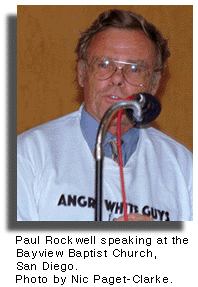|
Ward Connerly perverts the teachings of Dr. King
Dr. King fought and died for affirmative action to bring Americans together by Paul Rockwell Oakland, California
Shortly after the passage of the 1964 Civil Rights Act, Dr. King (as chairman of the Southern Christian Leadership Conference) initiated the first national affirmative action policy in the U.S., Operation Breadbasket. In Atlanta, Philadelphia, Chicago and many other cities, King staffers gathered disparity data on food industries and corporations. Within a few months, companies agreed to hire, promote and train a percentage of African Americans. King was so encouraged by early affirmative action programs that he wrote: "At present, SCLC has Operation Breadbasket functioning in some twelve cities, and the results have been remarkable: 800 new and upgraded jobs for Negro employees, several covenants with major industries." Dr. King supported affirmative action because he never confused the dream with American reality. As he put it, "A society that has done something special against the Negro for hundreds of years must now do something special for the Negro..." Legal formalities, he insisted, are not enough to democratize America. "Despite new laws, little has changed. The Negro is walled in by color and poverty. The law pronounces him equal-abstractly-but his conditions of life are still far from equal," and "I cannot see how the Negro will be totally liberated from the crushing weight of poor education and economic strangulation until he is integrated with power into every level of American life:' In face of gross inequities, King was color-caring, not color-coded. Unlike Connerly, King never pitted need-based programs against programs to achieve integration. King supported both kinds of social engineering: affirmative action for the poor and affirmative action to make America inclusive. Everything King wrote about social engineering presents a sharp contrast to the all-is-competition philosophy of Connerly and Gingrich. In King's profound teaching, affirmative action is not a preference for race over race; it is a preference for integration and full democracy. Nor is integration punitive; it benefits all Americans, white and non-white alike. It is dishonest- a cruel manipulation of our love for Dr. King- for Connerly to hang his corporate, free-market ideology on King's decontextualized phrase about "the content of our character." King insisted that white Americans are beneficiaries (not victims) of social policies that bring alienated Americans together. Integration makes America whole. The policies of inclusion are all prefigured in King's last great work, Where Do We Go From Here: Chaos or Community. King writes, "Integration is... mutual sharing of power... Justice cannot be achieved without changes in the structure of society. This is a multiracial nation where all groups are dependent on each other... . There is no white path to power, short of social disaster, that does not share power with black aspirations for freedom and human dignity." In 1965, a reporter chided King about so-called preferences. "Do your feel it's fair," the reporter asked, "to request a multibillion dollar program of preferential treatment for the Negro or any other minority?" King replied, "I do indeed ... . We have ample precedents for special compensatory programs. America adopted a policy of special treatment for her millions of veterans. There was no appreciable resentment of preferential treatment being given to a special group." It is no crime to disagree with King openly and honestly. But opponents of affirmative action, who reject King's vision of shared power, should not pretend to be King's missionaries. In recorded speeches, films, interviews and books, King left us a clear record of support for social engineering to achieve integration. In support of affirmative action, there is no body of literature more convincing, more relevant to our time, than the writings and speeches of Dr. King. In his last pro-affirmative action sermon, at the Washington Cathedral in Washington D.C., King said, "The roots of racism are very deep in our country, and there must be something positive and massive in order to get rid of all the effects of racism and the tragedies of racial injustice." These were King's last words on affirmative action. Four days later, he stepped onto the balcony at the Lorraine Motel in Memphis, Tennessee and was shot dead. The real Dr. King fought and died for affirmative action to bring Americans together. This article originally appeared in The Daily Californian. |
| Published in In Motion Magazine March 8, 1997. |
If you have any thoughts on this or would like to contribute to an ongoing discussion in the  What is New? || Affirmative Action || Art Changes || Autonomy: Chiapas - California || Community Images || Education Rights || E-mail, Opinions and Discussion || En español || Essays from Ireland || Global Eyes || Healthcare || Human Rights/Civil Rights || Piri Thomas || Photo of the Week || QA: Interviews || Region || Rural America || Search || Donate || To be notified of new articles || Survey || In Motion Magazine's Store || In Motion Magazine Staff || In Unity Book of Photos || Links Around The World NPC Productions Copyright © 1995-2020 NPC Productions as a compilation. All Rights Reserved. |


 Ward Connerly, former chair of the California Proposition 209 campaign, chose Dr. Martin Luther King Jr.'s birthday to announce a nationwide crusade to end affirmative action. In a follow-up interview with The Daily Californian ( Jan. 21), Connerly portrayed King as an opponent of integrationist affirmative action. Connerly is playing fast and loose with King's teachings, and it is time to set the record straight.
Ward Connerly, former chair of the California Proposition 209 campaign, chose Dr. Martin Luther King Jr.'s birthday to announce a nationwide crusade to end affirmative action. In a follow-up interview with The Daily Californian ( Jan. 21), Connerly portrayed King as an opponent of integrationist affirmative action. Connerly is playing fast and loose with King's teachings, and it is time to set the record straight.